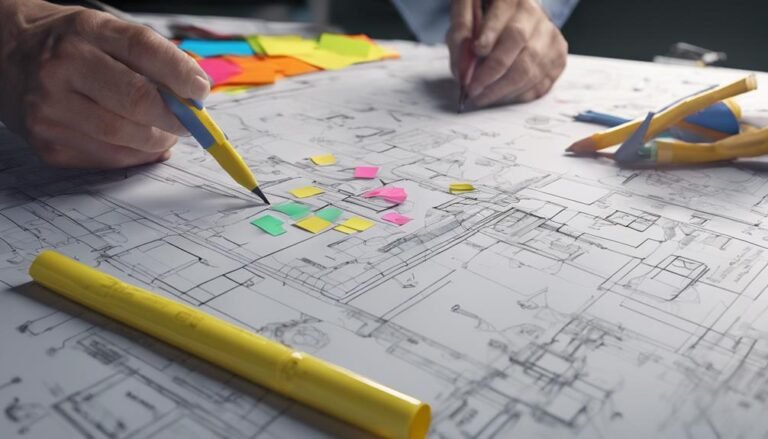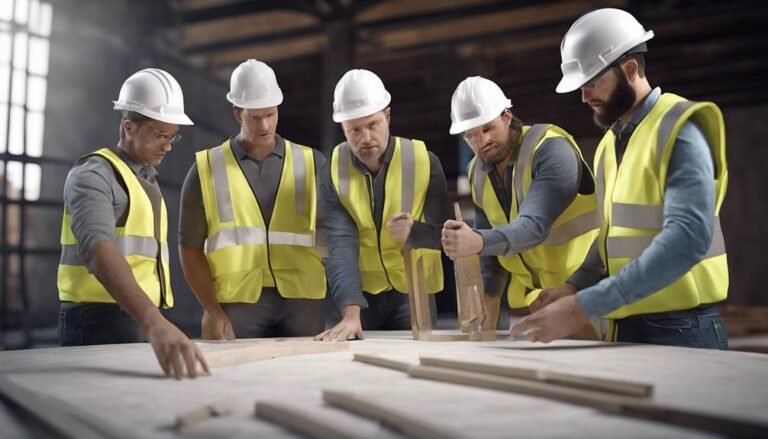Personal Wellness: Keeping Physically and Mentally Fit in Construction
Prioritize your physical and mental well-being in construction for peak performance. Boost mental resilience to tackle challenges effectively. Foster workplace relationships through positive engagement and clear communication. Enhance physical fitness with regular strength training, flexibility exercises, and a balanced workout routine. Maintain energy levels with a nutritious diet rich in essential nutrients. Manage stress with breathing exercises, mindfulness, and physical activity. Cultivate mental well-being through consistent mindfulness practices for increased productivity and a positive work environment. Take charge of your wellness to excel in the construction industry and achieve job satisfaction. Further tips await to optimize your health and performance.
Key Takeaways
- Regular strength training builds muscle and boosts endurance for construction work.
- Balanced nutrition with whole foods sustains energy levels and supports overall health.
- Stress management techniques like breathing exercises and mindfulness reduce stress levels.
- Establishing consistent mindfulness practices enhances focus and decision-making abilities.
- Building strong workplace relationships fosters a supportive environment for mental well-being.
Importance of Personal Wellness
To excel in the demanding field of construction, prioritizing personal wellness is essential for both physical and mental resilience. Mental resilience is important in handling the challenges faced in construction. Building strong workplace relationships can greatly impact your mental well-being. Engaging positively with colleagues, supervisors, and clients fosters a supportive environment that can help you cope with stress more effectively.
Maintaining good workplace relationships involves effective communication, active listening, and collaboration. By establishing rapport and mutual respect with your team members, you create a foundation for a harmonious work environment. This positive atmosphere can enhance your mental resilience by providing a sense of belonging and camaraderie.
Conflict resolution skills are also essential in maintaining healthy workplace relationships. Being able to address disagreements constructively and finding solutions together can prevent tensions from escalating and negatively impacting your mental well-being. Prioritizing personal wellness through positive workplace interactions is key to developing the mental resilience needed to thrive in the construction industry.
Physical Fitness Tips
Incorporating physical fitness tips into your routine can greatly enhance your overall well-being and performance in the construction industry. To guarantee you stay physically fit and ready for the demands of your job, consider the following:
- Strength Training: Engage in regular strength training exercises to build muscle mass and improve your overall strength. Focus on compound movements like squats, deadlifts, and bench presses to target multiple muscle groups simultaneously. Strengthening your muscles not only helps prevent injuries but also boosts your endurance during long workdays on construction sites.
- Flexibility Exercises: Incorporate flexibility exercises such as yoga or stretching routines into your weekly regimen. Improved flexibility can enhance your range of motion, reduce muscle stiffness, and help prevent strains or sprains. This is especially important in construction where bending, lifting, and reaching are common movements.
- Balanced Workout Routine: Establish a balanced workout routine that includes cardiovascular exercises, strength training, and flexibility work. Variety in your workouts not only keeps things interesting but also ensures you're strengthening different aspects of your physical health, promoting overall wellness in the demanding construction industry.
Nutrition Guidelines
Maintaining proper nutrition is vital for sustaining energy levels and supporting overall health in the construction industry. Healthy eating is essential for construction workers as it provides the necessary nutrients to fuel their demanding physical labor. When considering meal planning, it's important to focus on balanced meals that include a mix of carbohydrates, proteins, healthy fats, vitamins, and minerals.
Incorporate whole grains, lean proteins like chicken or fish, fruits, vegetables, and nuts into your meals to guarantee a well-rounded diet. Avoid excessive consumption of processed foods high in sugars and unhealthy fats, as they can lead to energy crashes and overall health issues in the long run.
Make sure you stay hydrated throughout the day by drinking an adequate amount of water. Proper hydration is crucial for maintaining focus, energy levels, and overall well-being on the construction site. By following these nutrition guidelines and practicing healthy eating habits, you can optimize your performance and well-being in the construction industry.
Stress Management Strategies
Implementing effective stress management strategies is essential for ensuring peak performance and well-being in the construction industry. In a high-pressure environment like construction, stress can impact productivity and overall health. Here are three key strategies to help you manage stress effectively:
- Breathing exercises: Engaging in deep breathing exercises can help regulate your body's response to stress. By focusing on your breath and taking slow, deep breaths, you can activate the body's relaxation response, reducing stress levels.
- Mindfulness meditation: Practicing mindfulness meditation involves being fully present in the moment and non-judgmentally accepting your thoughts and feelings. This practice can help you cultivate a greater sense of calm and improve your ability to handle stressors in a more composed manner.
- Physical activity: Regular exercise is a powerful stress reliever. Engaging in physical activity releases endorphins, which are natural mood lifters, and can help combat the negative effects of stress on both your body and mind. Whether it's going for a run, lifting weights, or practicing yoga, finding a physical activity you enjoy can considerably reduce stress levels in the construction industry.
Mental Well-being Practices
To optimize mental well-being in the construction industry, establishing consistent practices that nurture emotional resilience and cognitive sharpness is essential. Mental health is vital in maintaining overall well-being.
Engaging in mindfulness practices can greatly benefit mental health. Mindfulness involves being present in the moment, acknowledging thoughts and feelings without judgment. This practice can help reduce stress, improve focus, and enhance decision-making abilities. Incorporating mindfulness into daily routines, such as taking short meditation breaks or practicing deep breathing exercises, can promote mental clarity and emotional stability.
Additionally, setting aside time for self-reflection and introspection allows individuals to better understand their emotions and reactions. Prioritizing mental well-being through mindfulness practices can lead to increased productivity, better relationships with coworkers, and a more positive work environment.
Conclusion
In summary, maintaining personal wellness in construction is essential for your overall health and productivity. Just like a well-oiled machine, taking care of your physical and mental well-being guarantees smooth operation and longevity in your career.
By incorporating physical fitness, proper nutrition, stress management techniques, and mental well-being practices into your daily routine, you can work towards peak performance on and off the job site. Remember, you're the engine that drives your success in construction.







